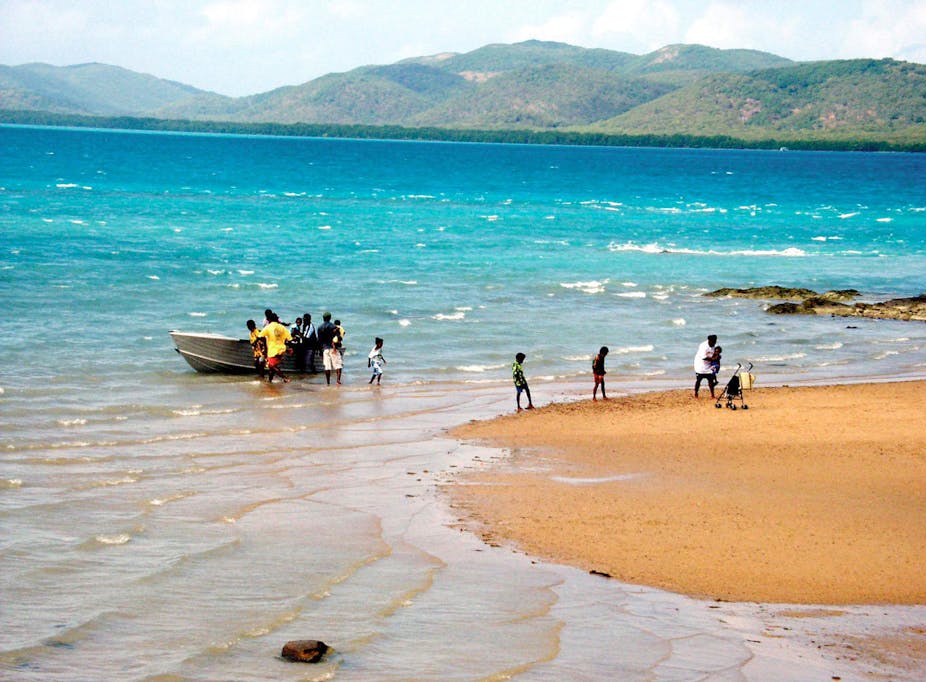It may have been 21 years since the landmark Mabo judgment recognised native title in Australia for the first time, but historic legal native title decisions are still taking place.
The High Court of Australia yesterday delivered a decision relating to the largest native title claim to sea country in Australia’s history in the Torres Strait. The native title claimants were successful in their appeal: the court unanimously upheld native title rights to commercial fishing.
Now that it’s been successful, the Torres Strait Sea Claim should open up a national conversation on the broader issue of Indigenous communities being more involved in making decisions about their own sea country. In this broader sphere of Indigenous marine governance, we have also recently seen the major expansion of a Sea Country Indigenous Protected Area in the Northern Territory.
A claim to sea country in the Torres Strait has been a long time coming. The original Mabo case included a sea claim, but the portion of the claim relating to the sea was not pursued to the High Court for technical legal reasons. The current claim, known as the Torres Strait Sea Claim, was lodged in 2001 and has now been through two Federal Court decisions before its appeal to the High Court.
The area in question is approximately 44,000 square kilometres of sea country in the Torres Strait in far north Queensland. Broadly, the claim relates to rights to enter, remain, use and enjoy the area and rights to access and take resources.
There are three important preliminary points to note in this case. The first is that native title rights were claimed on a non-exclusive basis. This means that the applicants did not claim the right to control access to the area. The reason for this approach was due to a previous High Court case in 2001, Commonwealth v Yarmirr.
Yarmirr was the first native title claim in Australia to sea country and it was held that native title over the sea could not be exclusive because it was inconsistent with public rights to navigate and fish and the international right of passage.
It is also important to note that most of the Torres Strait Sea Claim was determined in 2010 in the Federal Court and was not challenged. There were only two issues left before the High Court: commercial rights and reciprocal rights. Reciprocal rights, in short, were rights argued to be held on the basis of reciprocity between native title holders. The issue of reciprocal rights was dealt with very quickly in the High Court judgment and it was unanimously held that those native title rights could not be recognised.
Finally, as was set out in the original 2010 determination, native title rights and interests are subject to, and exercisable in accordance with, traditional laws and customs and the laws of Queensland and the Commonwealth. In this case, in particular, the applicants accepted that they could only undertake commercial fishing if they obtained a licence.
In 2010, the trial judge, Justice Finn, held that the applicants enjoyed non-exclusive native title rights to access, remain in and use their maritime areas and to access and take resources for any purposes. This included commercial purposes. Justice Finn’s decision overturned what had become a conventional understanding that exclusive possession was needed to maintain a claim to commercial rights. On appeal to the Full Federal Court, two judges overturned Justice Finn’s decision and a third judge agreed with Justice Finn in relation to this aspect of the case.
The High Court has now set aside the decision of the Full Federal Court. The High Court judgment was clear and concise and explains issues to do with whether regulation of native title is inconsistent with its existence. Legislation applies to all waters in the sea claim area. This legislation is both Commonwealth legislation (from 1952 onwards) and Queensland legislation (from 1877 onwards).
The High Court held that there was “nothing in the character” of a conditional prohibition on taking fish (such as the requirement of a licence) that meant that it extinguished the native title right. The majority judgment stated in its concluding paragraph that:
…telling the native title holders in this case, “You may not fish for the purpose of sale or trade without a licence”, did not, and does not, sever their connection with the waters concerned and it did not, and does not, deny the continued exercise of the rights and interests possessed by them under the traditional laws acknowledged, and traditional customs observed, by them.
The Torres Strait Sea Claim is a great step forward and of enormous significance to the Torres Strait Islander people who have fought so hard for this win. However, this native title decision should signal the start of a reconsideration of the approach Australia has taken more broadly to Indigenous marine governance.

